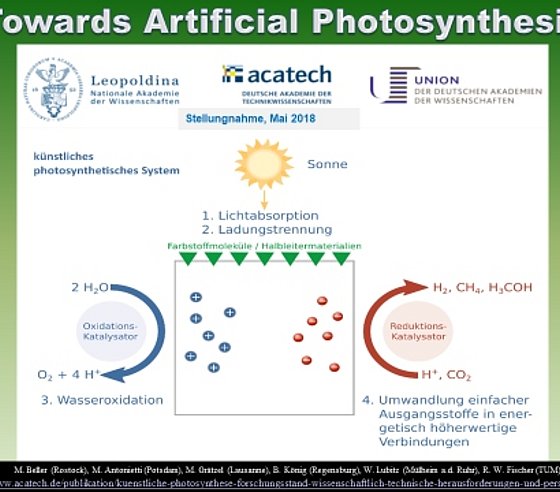4. Artificial Photosynthesis – sustainable fuels and basic chemicals


Currently, various artificial photosynthesis scenarios are being intensively researched. They are based on natural photosynthesis, but do not copy it 1:1. One of these scenarios aims to produce "green" hydrogen using solar light. This is possible either through water electrolysis with electricity provided by photovoltaics or by direct water photolysis using suitable photocatalysts. As hydrogen can be used in several ways either as a fuel or a reduction agent and basic chemical for syntheses, the corresponding hydrogen technology would be carbon-free. In an alternative scenario, artificial photosynthesis is defined as following by the German Academies of Sciences:
“Artificial photosynthesis is used to produce chemical energy carriers and valuable materials using sunlight as the only source of energy in integrated devices and systems. The particular advantage of this approach is its ability to provide renewable energy in a storeable and portable form. For this purpose, a core principle of the biological prototype is mimicked: the coupling of light-induced charge separation with catalytic processes for the production of energy-rich compounds."
Excerpt translated to English. The full report in German can be found on the Leopoldina website.
The four essential partial processes of artificial photosynthesis are 'light absorption', 'charge separation', 'oxidative water oxidation' and 'the reduction of protons and carbon dioxide to energy-rich carbon compounds' such as methane, methanol, hydrocarbons and carbohydrates. Solar light is used exclusively and directly as the only source of energy without the detour via photovoltaics. The products obtained can be used as fuels or as basic chemicals for further syntheses. Just like the hydrogen scenario, this scenario is also climate-neutral, resource-saving and sustainable.
Defossilization instead of decarbonization
In both transport and industry, the goal must be to move away from fossil fuels and not necessarily a "carbon-free" technology that media and politics often call for. Sustainability with "green chemistry" is also possible with carbon compounds following the model of the natural carbon cycle in the biosphere. Anyone who is nevertheless in favour of "prohibiting combustion engines" should be aware that every human being is a "natural combustion engine" that obtains all the energy for muscle activity, body heat, electrical signals in the neuronal system and other vital processes in the organism exclusively from the combustion of organic carbon compounds.
In the long term, the truly sustainable solution for mobility is not electric propulsion for cars, airplanes and ships, but propulsion with CO2-neutral fuels produced by artificial photosynthesis. This vision is supported by the following facts and forecasts from a GDCh special edition on climate protection (Reinhard Zellner: Zu viel CO2 aus dem Verkehr – Ist Elektromobilität die Lösung? GDCh special edition, Frankfurt, 2019):
- Electric vehicles are more CO2-intensive to manufacture than combustion engines due to the amount of material required for the batteries,
- Fuels such as petrol and diesel with mass-related energy densities of 12 kW ∙ kg-1 are superior to solid-state storage systems such as lithium-ion batteries by a factor of at least ten,
- reliable life cycle assessments place electric cars E-cars in Germany roughly on the same level as economical combustion engines,
- Fuel cell vehicles are already considered a sensible alternative to battery-powered electric vehicles and
- synthetic fuels based on H2 and CO2 as well as further optimization of engine technology can lead to the long-term acceptance of the combustion engine.
The entire text of the above-mentioned article is freely accessible in German at GDCh.
The future of mobility in Germany and the world will most likely be a mix of different drive systems in the course of the 21st century and beyond. However, the trend "away from fossil fuels towards solar technologies" will predominate.
